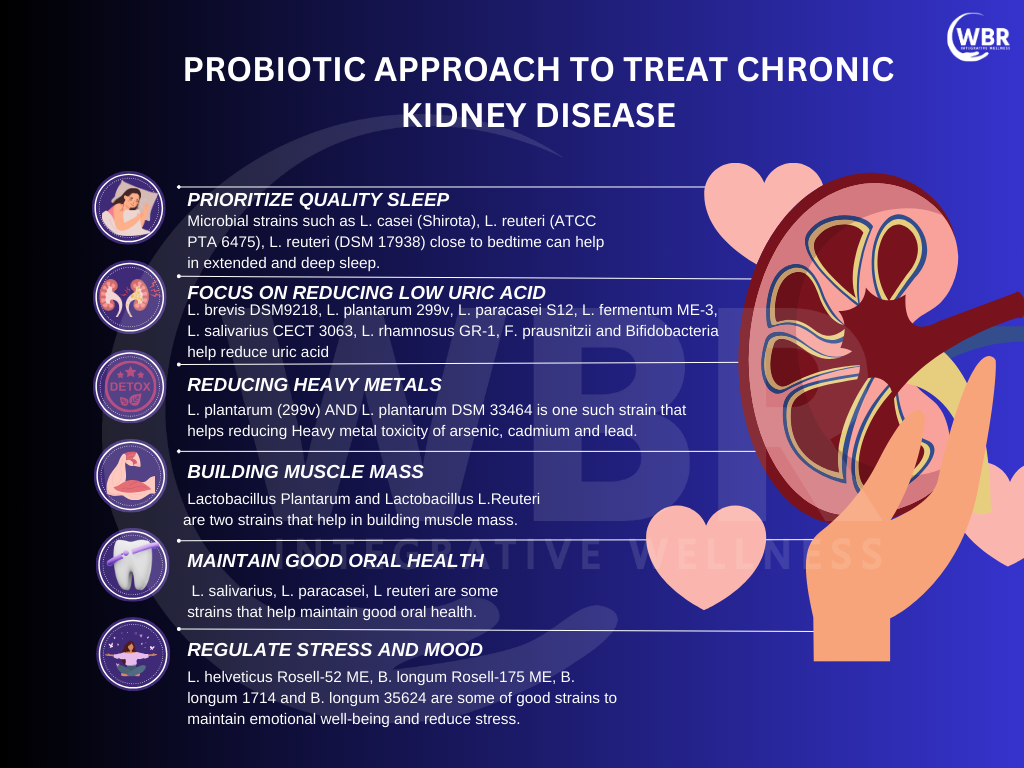Probiotics and Prebiotics Therapy for Chronic Kidney Disease
Chronic Kidney Disease (CKD) is a chronic condition casting a shadow on the lives of millions around the world. For those grappling with Kidney Disease condition, every day becomes a battle, where the body’s fundamental filtration system falters, leading to a cascade of health issues. The toll it takes is not just physical but profoundly affects the quality of life. Amidst this struggle, Probiotics and Prebiotics therapy help in offering relief to the patients. Probiotics, beneficial bacteria that promote gut health, and prebiotics, their nourishing counterparts, have shown promise in mitigating complications associated with CKD. By fostering a balanced gut microbiota, they hold the potential to alleviate inflammation, improve immunity, and enhance overall well-being. In this pursuit of enhancing lives, exploring the synergistic relationship between probiotics, prebiotics, and chronic kidney disease becomes imperative, offering a glimmer of optimism for those enduring the daily challenges of this condition.
What is Chronic Kidney Disease?
Chronic Kidney Disease (CKD) is like a stealthy intruder, often creeping into one’s life unnoticed. Imagine your kidneys, serving as the body’s meticulous janitors, filtering waste and balancing fluids. Now, picture them under siege. CKD is a progressive condition where these vital organs lose their ability to function effectively over time. It’s a silent adversary, gradually impairing their filtering prowess, leading to a buildup of toxins in the bloodstream and wreaking havoc on the body’s delicate balance.
CKD doesn’t discriminate; it affects people of all ages and backgrounds. Its causes are diverse, from autoimmunity, high blood pressure, diabetes, drug toxicity, infection to genetic predispositions. The consequences, though, are shared: fatigue, swelling, and altered urination patterns, among others. Understanding CKD is crucial because early detection and management significantly slow down its progression
CKD Connection To Diabetes
Chronic Kidney Disease (CKD) and diabetes share a complex relationship. High blood sugar levels in diabetes damage the tiny blood vessels in the kidneys, leading to CKD. In return, CKD worsens diabetes control, creating a vicious cycle. It’s like a stealthy predator; you might not notice until it’s in advanced stages. Monitoring blood sugar levels, maintaining a healthy lifestyle, and regular check-ups are your best weapons. Understanding this relationship empowers you to take charge of your health, preventing the silent havoc these conditions wreak on your kidneys and overall well-being.
CKD Connection To Autoimmune Disorders
In autoimmune diseases, the immune system mistakenly attacks the body’s tissues. When this warfare extends to the kidneys, it triggers CKD. Lupus, vasculitis, and rheumatoid arthritis are culprits. Moreover, these disorders not only inflame kidney tissues but also hamper the body’s ability to fight kidney infections. Hence, it’s a double-jeopardy situation. Thus, early detection is vital and helps fight the symptoms and repercussions. Furthermore, understanding this connection arms you with knowledge, ensuring proactive steps to protect your kidneys.
CKD Connection To Hypertension
Nitric Oxide, a molecule produced by our body, plays a pivotal role in regulating blood flow and blood pressure, crucial for kidney health. In CKD, Nitric Oxide production falters, impairing kidney function and causing complications. Furthermore, with a lack of Nitric Oxide, the kidney struggles to function. Understanding this relationship unveils the importance of Nitric Oxide in kidney function, urging us to boost the production of this crucial element in our body.
Probiotic Approach to Chronic Kidney Diseases
Beyond traditional treatments, focusing on a specific probiotic approach can significantly improve kidney health. One just needs to be careful in case of immune over-activation to start slow and monitor symptoms. One can refer to this histamine degrading specific probiotics. Let’s explore some essential probiotic strains which help for optimal kidney health and also reduce other underlying diseases and symptoms.
Sleep: Consumption of microbial strain such as L. casei (Shirota), L. reuteri (ATCC PTA 6475), L. reuteri (DSM 17938) close to bedtime can help in extended and deep sleep.
Reducing Low Uric Acid: The list of gastrointestinal microbes that metabolise uric acid in various ways is growing rapidly, mostly Lactobacillus species that have evolved to be efficient metabolizers of purines and other genetic material. Among the species/strains that have been associated with reduced blood and urinary levels of uric acid include, L. brevis DSM9218, L. plantarum 299v, L. paracasei S12, L. fermentum ME-3, L. salivarius CECT 3063, L. rhamnosus GR-1, F. prausnitzii and Bifidobacteria species do not themselves metabolise uric acid.
Reducing Heavy Metals: L. plantarum (299v) AND L. plantarum DSM 33464 is one such strain that helps reducing Heavy metal toxicity of arsenic, cadmium and lead.
Building Muscle Mass: Engage in regular exercise, including strength training. Muscle mass supports metabolic balance and alleviates strain on the kidneys. L. plantarum and L. reuteri (ATCC PTA 6475), L. reuteri (DSM 17938)) are two strains that help in building muscle mass.
Better Oral Health: Probiotics could have an important role to play in the clinical management of dental caries and the periodontal diseases as disease begin from mouth. Some of key strains are L. salivarius, L. paracasei, L reuteri
Better mood and emotional health: Reducing stress and maintaining good mental health are key factors for healthy kidneys. L. helveticus Rosell-52 ME, B. longum Rosell-175 ME, B. longum 1714 and B. longum 35624 are some of good strains to maintain emotional well-being and reduce stress.
Embracing these lifestyle adjustments and probiotic strains empowers individuals in their CKD journey, fostering overall well-being and kidney vitality.

Probiotics for Diabetes
For diabetic patients, some probiotics are potential allies, offering holistic well-being. Let’s delve into the world of specific probiotic strains and their impact on diabetes which in turn also help in managing symptoms and problems related to Chronic Kidney Disease.
Bacillus Subtilis: This robust probiotic aids digestion, promoting gut health. It fortifies the intestinal barrier, preventing harmful substances from entering the bloodstream and potentially affecting blood sugar levels.
Bifidobacterium Bifidum: Known for its resilience, this probiotic enhances immune function and supports a balanced gut microbiome. By fostering a healthy gut environment, it contributes to overall metabolic stability in individuals with diabetes.
Bifidobacterium Longum: With its anti-inflammatory properties, this probiotic strain helps modulate the immune response. By reducing inflammation, it indirectly assists in managing insulin resistance, a core challenge in diabetes.
Lactobacillus Plantarum: Renowned for its diverse health benefits, this probiotic strain positively influences glucose metabolism. It aids in breaking down carbohydrates, potentially regulating blood sugar levels and promoting metabolic harmony.
Lactobacillus Reuteri: This probiotic powerhouse exhibits antimicrobial properties, shaping a robust gut environment. By mitigating harmful bacteria, it supports gut integrity, indirectly impacting insulin sensitivity and glucose control.
Leuconostoc Mesenteroides: Apart from its role in fermentation, this probiotic strain contributes to gut diversity. A balanced gut flora is essential for individuals with diabetes, as it influences digestion and absorption, potentially affecting blood sugar fluctuations.
Akkermansia muciniphila: Akkermansia muciniphila, a probiotic, aids in diabetes management by improving gut barrier function, reducing inflammation, and enhancing glucose metabolism. It regulates intestinal permeability, modulates mucin production, and increases levels of beneficial short-chain fatty acids, which collectively ameliorate insulin sensitivity, blood glucose levels, and systemic inflammation in diabetic individuals. Including prebiotic fibres and polyphenols in the diet with berries and peppers will boost Akkermensia levels, leading to better health in a diabetic patient.
Probiotics for Boosting Nitric Oxide
Some strains of probiotics not only contribute to gut health but also play a crucial role in boosting nitric oxide levels, fostering optimal blood flow and overall well-being.
Bacillus Subtilis: This probiotic powerhouse aids Nitric Oxide production by promoting a balanced gut environment. Moreover, by supporting digestive health, it indirectly enhances NO synthesis ensuring efficient blood circulation and cardiovascular health.
Bifidobacterium Bifidum: With its ability to enhance gut integrity, this probiotic fosters an environment conducive to Nitric Oxide production. Furthermore, a healthy gut lining allows for the efficient absorption of nutrients, contributing to NO synthesis and improved vascular function.
Lactobacillus Plantarum: Known for its diverse health benefits, this probiotic strain aids in Nitric Oxide synthesis by reducing oxidative stress. Additionally, scavenging harmful free radicals, it maintains NO bioavailability, promoting optimal blood vessel dilation and cardiovascular health.
Pediococcus Acidilactici: This probiotic strain supports gut health, creating an environment where Nitric Oxide production thrives. Furthermore, ensuring a balanced gut microbiota, indirectly influences Nitrix Oxide levels, facilitating improved blood flow and overall cardiovascular function.
Saccharomyces Boulardii: Renowned for its resilience, this probiotic enhances gut health, indirectly impacting NO production. Moreover, a balanced gut microbiome, fostered by this strain, supports efficient nutrient absorption and NO synthesis, promoting optimal blood circulation and cardiovascular well-being.
Lactobacillus Fermentum: This strain boosts nitric oxide levels and enhances nitric oxide production. Furthermore, it promotes the conversion of L-arginine to nitric oxide, leading to improved blood flow, and cardiovascular health. This mechanism contributes to regulating blood pressure and supporting overall vascular function. The increased Nitric Oxide protects against inflammation and various diseases caused by pathogenic bacteria like Salmonella, Shigella and UTIs from E.Colli.

Probiotics for Reducing Kidney Load
Lactobacillus Plantarum: Lactobacillus Plantarum is a phenomenal probiotic that aids in reducing uric acid load by promoting the breakdown of purines into soluble compounds, thereby inhibiting uric acid crystallization in the kidneys. It enhances renal excretion of uric acid, reducing its accumulation and possible crystallization, thus preventing kidney stone formation.
Lactobacillus L. Reuteri: Lactobacillus L. Reuteri reduces uric acid load by regulating gut microbiota, enhancing uric acid metabolism, and increasing renal excretion efficiency. It promotes the conversion of uric acid into more soluble compounds, reducing its concentration in the bloodstream and lessening the burden on the kidneys.
Renadyl: Renadyl, comprising S. Thermophilus, L. Acidophilus, and B. Longum, aids in Chronic Kidney Disease (CKD) management by regulating gut microbiota. It enhances the breakdown of uremic toxins and reduces uric acid load through improved renal function and metabolic balance, mitigating CKD progression and minimizing renal burden.
Prebiotics for Managing Chronic Kidney Disease
Emerging research suggests that certain prebiotic strains sometimes positively impact CKD management by promoting gut health. Let’s delve into the specific benefits of Acacia, Inulin, FOS, PHGG, Psyllium, and Fructooligosaccharides.
Acacia: Acacia, a prebiotic fibre, benefits CKD patients by fostering a balanced gut microbiome. Its fermentation in the colon produces short-chain fatty acids, which reduce inflammation and improve overall kidney function.
Inulin: Inulin, a soluble fibre, has shown promise in CKD management by promoting the growth of beneficial gut bacteria. Improved gut health contributes to reduced inflammation and enhanced nutrient absorption, positively impacting kidney function.
FOS (Fructooligosaccharides): FOS serves as a prebiotic that selectively stimulates the growth of beneficial bacteria in the gut. By fostering healthy gut microbiota, FOS contribute to systemic health improvements, potentially aiding in the management of CKD.
PHGG (Partially Hydrolyzed Guar Gum): PHGG, a soluble fibre derived from guar gum, offers benefits for CKD patients. Its prebiotic properties support gut health, potentially mitigating inflammation and contributing to improved overall kidney function.
Psyllium: Psyllium, a soluble fibre, has shown promise in CKD management. Its prebiotic effects may enhance gut health, leading to reduced inflammation and improved renal function, making it a valuable addition to the dietary considerations for CKD patients.
Conclusion
By nurturing a balanced gut microbiome, we pave the way for improved renal function, reduced inflammation, and enhanced overall well-being. The synergy of probiotics and prebiotics orchestrates a harmonious melody within our bodies, influencing not just digestion but the very core of our health. As we embrace this holistic approach, we embark on a transformative journey, where gut health becomes the cornerstone of kidney vitality and holistic wellness.









